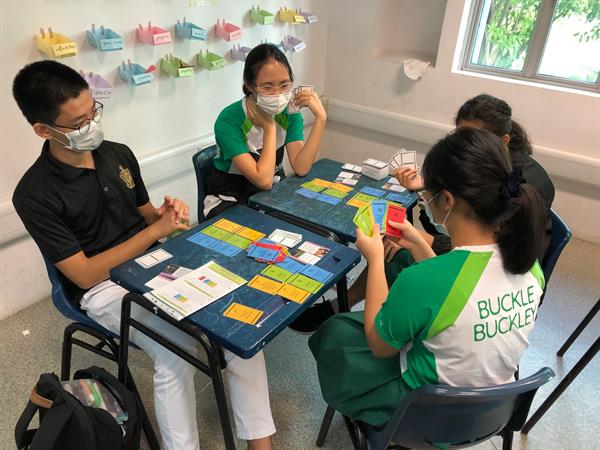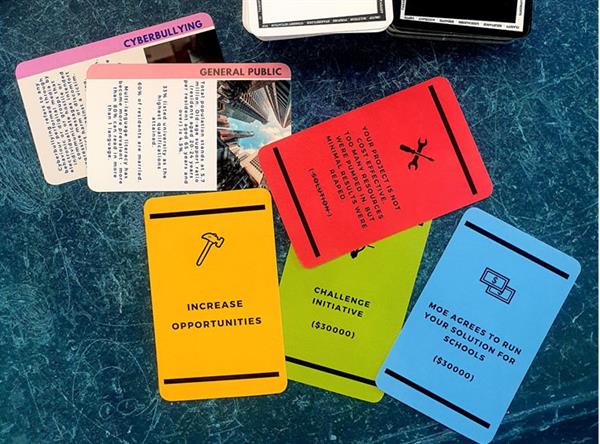Four students sit around a table, holding cards in their hands. There are occasional shouts and sounds of laughter. This is no gambling den, but a Project Work (PW) class for Year 5 students at Raffles Institution (RI).
 Year 5 students playing the #ANYHOWANYHOW card game as part of their Project Work introductory class. Key concepts were introduced in the game. PHOTO: RAFFLES INSTITUTION
Year 5 students playing the #ANYHOWANYHOW card game as part of their Project Work introductory class. Key concepts were introduced in the game. PHOTO: RAFFLES INSTITUTION
In their search for better teaching methods, PW tutors Lydia Tan, Dawn Wu and Joyce Chua have created #ANYHOWANYHOW, a card game to explain Project Work concepts to students. Students are required to take Project Work as a subject at the A-Levels. During classes and assessments, they come up with solutions to real-life problems, and substantiate them. Working in groups of four, they present their solutions and submit a report at the end of Year 5 for their A-Level assessment.
Being a new subject with no equivalent at the secondary level, students may have difficulty grasping the new concepts and the rigour that they are expected to show in their work, said the Mrs Tan, Mrs Wu and Mrs Chua. The card game introduces the key concepts in Project Work and gives students a broad understanding of the academic requirements of the subject.
“Previously, students would spend the first few months trying to grasp the different requirements and the level of critical and creative thinking required. Now most of the concepts can be explained broadly within one lesson,” said Mrs Chua.
Mrs Tan agreed. She added: “Before this, it could be a very painful and frustrating process for the students. They would have their project proposals rejected and the students would not understand the reason behind it.”
With the gamification of PW, students are now more enthusiastic about learning the subject. The game’s tongue-in-cheek nature allows students learn more effectively, as they “got the jokes”, Mrs Tan added.
“From the game, they can deduce what [kind of solutions] can be done, and what cannot be done. Not just everything ‘
anyhow anyhow’,” said Mrs Wu, referencing the name of the card game.
Commenting on her learning experience, Yu Xuan (22S07A) said: “The game was fun and relatively easy to understand. It was a refreshing new way of teaching and helped us understand what is needed for PW better.”
 The game cards include topics (top left), and action cards (coloured cards at bottom right). PHOTO: RAFFLES INSTITUTION
The game cards include topics (top left), and action cards (coloured cards at bottom right). PHOTO: RAFFLES INSTITUTION
Students also take on the perspective of the evaluator in the game, in their quest to ensure fair play. “They become the ones checking on their fellow student’s ideas. And through that, they learn what is required of them,” added the tutors.
Another student, Shelby Lee (22S03D) said: “Rather than just the usual classroom setting, card games definitely make the lesson less mundane. When sitting in groups, we can learn from one another by watching our group mates.”
The three tutors went through three to four iterations of the game before rolling out the current version. Birthed as two different games to encourage creative and critical thinking respectively, the games were eventually amalgamated into the version implemented in classes today.
To get inspiration, the three teachers played many other games. The eventual gameplay mechanics in #ANYHOWANYHOW were modified from local card game
The Singaporean Dream and mahjong.
The game was supported by RI’s Innovation Fund, set up to support novel ground-up solutions by staff to improve work processes in the school. “I’m quite happy that our teachers are innovating and creating new and meaningful experiences for their students, and that our Innovation Fund is having an impact” said Principal Frederick Yeo.
Mr Yeo hopes that the teachers’ innovation will inspire all educators to continue to seek new ways to help their students learn better. He added: “I’m very proud of our teachers for going the extra mile.”
With the successful rollout of the game for the whole Year 5 level in 2021, the three Project Work tutors have plans to take it further. With widespread adoption in RI under their belt, they intend to fine-tune and observe how the game benefits students on a larger scale and continue to make improvements.
In the future, the three tutors hope to use this game to support more students and teachers taking PW. “Ultimately, the goal is to create a pedagogical package so that any teacher can use this as a resource for their teaching,” the tutors said. “Then many more students can benefit from this.”
[Note: All activities depicted in this article took place during Phase 3, in February this year, in accordance with safe management measures at the time.]